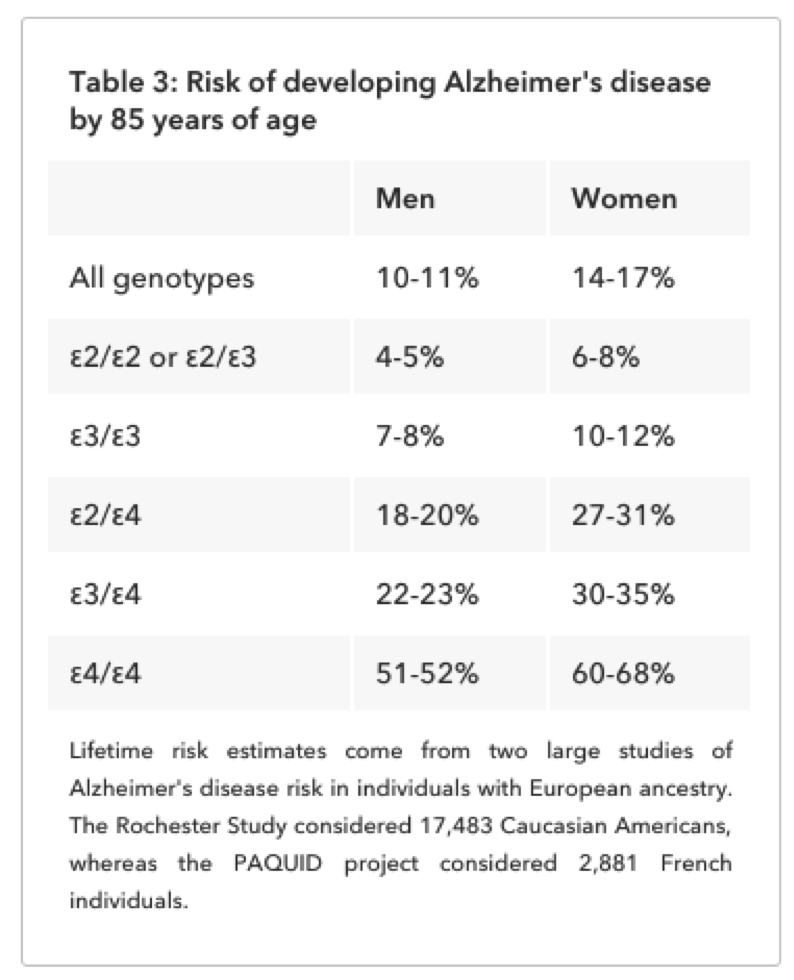High-fat diets might be popular, but did you know that for roughly 20% of the population it can raise your risk of Alzheimer’s disease by up to 10 fold?
Of course, that’s a staggering number and something we definitely want to avoid. Let’s learn why today, so that you can learn if you are at risk and how to minimize your risks right away.
Fake Intake and Nutrition
Let’s start off with a little story about myself. I first started thinking about nutrition in the late ’70s and early ’80s.
At that point, the advice from the top health experts was pretty simple: avoid sugar, avoid chemicals and focus on adding more natural goods.
During the late ’80s, we began to see the low-fat movement start to really take hold. It was all the rage among those who were active and/or trying to lose weight.
Just like all fads, though, it eventually died down. Soon, it became that low-fat simply was not enough, so everyone started going fat-free.
Personally speaking, I did really well on low-fat diets. It provided me with lots of good energy, and I could maintain my body weight more easily. It was super helpful in helping me to perform as an athlete.
Frankly, fat-free diets, frankly, just did not work as well. I always found myself feeling hungry and I was gaining weight. I could not seem to focus and my skin started to become dry.
This is when I started reading more about how certain fats, specifically omega-3 and omega-6, are essential for our bodies. It seemed radical at the time, but now we know just how obvious it really was all along.
The Rise of Paleo
Fast forward a couple of decades and paleo started to become the latest dieting craze. These are the kind of high-fat, high saturated fat diets that you have heard about.
I gave them a try as well and it totally made sense – I mean, what kind of guy does not want to feel like a macho, burly, manly caveman?
To tell you the truth, my health completely tanked. I was sluggish, and my athletic performance plummeted. I read about the “fat-adapted athlete movement,” and so I figured that I had to try harder and become “fat-adapted” for it all to work for me.
Many others had the same experience I did, but many did not. Why would some do well on a certain diet, while others felt awful? The reason here is that we do not all metabolize fat the same way. The biggest reason for this is the APOE gene.
I have a version called the 3/4 genotype, which roughly 20% of adults have. For us, not only do we feel worse on high-fat, low-carb diets, we are also placed at more risk because of them.
It is important to know that an APOE gene-specific diet for weight loss is important to consider, and we’ll break down why today.
Please let me tell you all about the gene, what it means, and how you can find out about yours – also, what you can do about it today.
What Is The APOE Gene?
The APOE gene affects the size of our chylomicrons, which means that it changes how we metabolize fats throughout our bodies. It is true for our bloodstream, as well as in our brains.
So, fats and cholesterol are transported differently based directly on these chylomicrons in our bodies.
Think about it like this. When I think of chylomicrons I think of carts in a mine, you know those carts that sit on tracks and transport the coal from inside of the mine to the great outdoors?
These are like the chylomicrons in our body which help move fats around. If they are too big, we are less able to get the “coal” out from the mine – it is all about size, which determines how well you move fats throughout your body.
Key Insight: The APOE gene informs how chylomicrons form in our bodies, from person to person, which has a direct effect on our overall health.
Why Does it Matter?

The APOE gene matters, basically, because of the disease risks involved. These can include:
- Alzheimer’s
- Stroke
- Diabetes
- Obesity
- Heart Disease
- Nails
In Conclusion: Knowing more about your genotype is crucial to your overall health. It can give you a better idea of what your body needs, and how you need to treat your body to guarantee optimal health in the long-term. That being said, it can also give you lots of information that you might not want to know – like your probable risk for diseases like Alzheimer’s. Really think about if you want to know, and then make the right decision for your and your health (both mental and physical).
Which Types Are There?
There are different types of the APOE genotype, which are the:
- 2 alleles
- 3 alleles
- 4 alleles
Now, you can imagine the different combinations that we might have, such as: 2/2/, 2/4, etc. The most common, and the ones we are going to be talking about today, are:
- 2/3 (for an APOE 2/3 diet)
- 3/3 (for an APOE 3/3 diet)
- 3/4 (for an APOE 3/4 diet)
- 4/4 (for an APOE 4/4 diet)
These are the most common ones for the vast majority of people. Of those, the 2/3 and the 3/3 are the most common that we see in average populations. While it might vary based upon ethnicity, this is what is most typical across the board.
How Can You Know Which One You Have?
There are definitely options to find out. There are regular labs which can show these genotypes through blood tests.
By and large, this information can quickly become less confidential. If you are okay with this type of information being on public record, then it is definitely a route you can pursue. These tests are also typically not covered by insurance, which is not helpful.
Typically, the most cost-effective way to find out more is through 23andMe.1
While I have no personal financial involvement with them, they remain a good option for those looking to find out more – and it only costs a couple of hundred dollars, which is much more affordable when compared to the alternatives.
The nice thing about 23andMe is that you get so much information through their reports, like ancestry knowledge and other fun things.
While there may not be a huge wealth of knowledge about your health, due to federal regulations, it can still provide you with some of that important genotype information that you need to know.
Step 1

Open the page and go to “Browse Raw Data” under the “Tools” tab.
Step 2

In the search bar, paste the following text: rs429358
Step 3
Look at your results. You will have 3 possible results on the far right column, either: CC, CT, or TT.

Step 4
Go back to the “Browse Raw Data” page and search “rs7412.” Look at your results. You will have 3 possible results on the far right column, either CC, CT, or TT.

What does this mean to you?
| Variant | rs429358 | rs7412 |
| E2 | T | T |
| E3 | T | C |
| E4 | C | C |
Key Insight: We each have two APOE gene variations. Use both codes to find your combination. In my case I’m a 3/4 variation since I have one C/T and one C/C.
Step 5
Here’s how the genotypes relate to Alzheimer’s risk.

If you have the 4 genotype, higher fat diets and higher amounts of saturated fat are not likely safe for you. They are more apt to raise the risks of Alzheimer’s disease, heart disease, diabetes, obesity, and stroke.
What To Do With Your Genotype Results?
Once you know your genotype, now you have to know what is relevant and the action steps that you can take to preserve your health.
Head Injuries
Knowing your genotype can give you a really good idea about how your brain might respond to a potential concussion.2
If you are an athlete of any kind, and you suffer a concussion, your genes are going to determine how long it takes you to recover.
This means that if someone who has “average” genes takes ten days to recover from a mild concussion, it could take someone with different genes twice as long.
Dietary Fat
Another thing that we want to focus on is the dietary quality and quantity of the fats we are putting into our bodies, based on our genotype.
3/4 and 4/4
For this combination, it is better to be lower in overall fat consumption. Fat calories are able to make up 15 – 20% of your total caloric intake for these types.
The best fat types are polyunsaturated and monounsaturated. At the same time, avoiding alcohol is important – because it can speed up the process of brain ageing and increase your potential risk for Alzheimer’s.3
3/3
A low to moderate fat diet is important here – making up 15 – 30% of our total caloric intake. The best fat types here will be monounsaturated and polyunsaturated fats.
2/2 and 2/3
A low-fat, low-carb or moderate-fat diet will do well here. Fat calories should make up 20 – 50% of our total caloric intake. The best types here will be monounsaturated fats, polyunsaturated fats and saturated fats.
In Conclusion: Have you ever heard of the term “results may vary”? That is what this is all about. Depending on our genotype, we need to monitor what we are putting into our bodies – as it might have a direct effect on how we feel now and how we feel in the future.
Monounsaturated and Polyunsaturated

You might have noticed that the main fat types we noted for each of these genotypes included monounsaturated and polyunsaturated fats (Read: Rethinking vegetable oil).
Let’s look into how we can get more of each into our diets.
We can bring more polyunsaturated fats into our diets with:
- Corn Oil
- Sunflower Oil
- Fatty fish, such as salmon, mackerel, herring and trout
We can find monounsaturated fats in:
- Olive Oil
- Canola Oil
- Peanut Oil
- Sesame Oil

Your Individual Needs
This happens all of the time in medical research. 1,000 people are put on one regimen.
Maybe they are all put on a low-fat diet, maybe it is something else. The fact of the matter is that some may do well, some may do worse and some may see no big results.
The problem is that when you average all of that together, it can look like everyone did kind of okay.
“Averaging out” your health is not something that you should be doing and it is why you cannot always stick with these diets that have worked for the “average population.”
Understanding your individual needs is so important, for your health today and your health tomorrow.
Your Health & Your Thyroid
While you are learning more and more about body, why not your thyroid too? Take the thyroid quiz today (Click Here), and learn more about your body needs to thrive.
Sources
1 – https://www.23andme.com/
2 – https://academic.oup.com/bja/article/99/1/43/269949/Impact-of-genetic-factors-on-outcome-from-brain
3 – https://www.ncbi.nlm.nih.gov/pmc/articles/PMC3865814/

1. Schedule a Thyroid Second Opinion with me, Dr. C, Click Here for Details
2. Download and use my Favorite Recipes Cookbook Here
3. Check out my podcast Medical Myths, Legends, and Fairytales Here
Dr. Alan Glen Christianson (Dr. C) is a Naturopathic Endocrinologist and the author of The NY Times bestselling Adrenal Reset Diet, The Metabolism Reset Diet and The Thyroid Reset Diet.
Dr. C’s gift for figuring out what really works has helped hundreds of thousands of people reverse thyroid disease, lose weight, diabetes, and regain energy. Learn more about the surprising story that started his quest.


